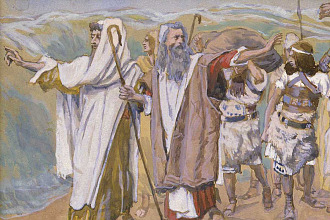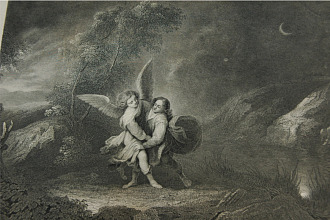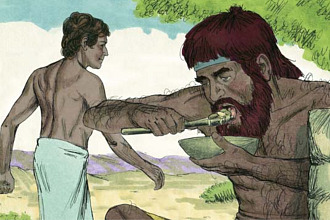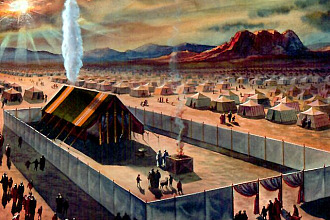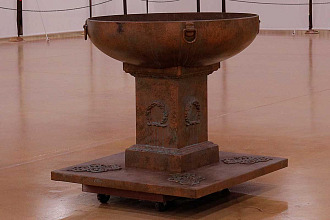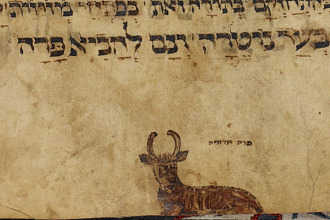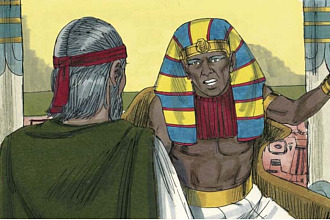Parasha for the Week: Mishpatim: Exodus 21:1 - 24:18.
Haftarah: Jeremiah 33:25 - 34:22.
Apostolic Writings: Matthew 25:31 - 46.
Overview
Israel receives a series of laws concerning social justice. Topics include:
- Proper treatment of Jewish servants
- A husband’s obligations to his wife
- Penalties for hitting people and for cursing parents, judges and leaders
- Financial responsibilities for damaging people or their property, either by oneself or by one’s animate or inanimate property, or by pitfalls that one created
- Payments for theft
- Not returning an object that one accepted responsibility to guard
- The right to self-defense of a person being robbed.
Other topics include:
- Prohibitions against seduction
- Prohibitions against witchcraft
- Prohibitions against bestiality and sacrifices to idols
- The Torah warns us to treat the convert, widow, and orphan with dignity.
- To avoid lying
- Usury is forbidden, and the rights over collateral are limited.
- Payment of obligations to the Temple should not be delayed, and the Jewish People must be holy, even concerning food.
- The Torah teaches the proper conduct for judges in court proceedings.
- The commandments of Shabbat and the Sabbatical year are outlined.
- Three times a year -- Pesach, Shavuot and Succot -- we are to come to the Temple.
- The Torah concludes this listing of laws with a law of kashrut: not to mix milk and meat.
G-d promises that He will lead the Jewish People to the Land of Israel, helping them conquer its inhabitants, and tells them that by fulfilling His commandments they will bring blessings to their nation.
The people promise to do and listen to everything that G-d says. Moshe writes the Book of the Covenant, and reads it to the people.
Moshe ascends the mountain to remain there for 40 days in order to receive the two Tablets of the Covenant.
Mishpatim Parasha’s Title
After giving the Ten Commandments, the Torah starts to list the mitsvot G-d wants for His people. The laws called Mishpatim (Judgment) are the social laws that Israel is ordered to follow in their land, most of these laws are describing in detail what it means "Love your neighbor as yourselves" or the practical way of the second table of the Ten commandments, which are all about our neighbors.
Promise of Protection
Mishpatim is One of the longest Torah portions, containing 23 positive commandments and 30 negative precepts.
Included are laws regarding:
The Hebrew manservant and maidservant, manslaughter, murder, injuring a parent, kidnapping, cursing a parent, personal injury, penalty for killing a slave, personal damages, injury to slaves, categories of damages and compensatory restitution, culpability for personal property damage, seduction, occult practices, idolatry, oppression of widows, children and orphans.
The portion continues with the laws of: lending money, not cursing judges or leaders, tithes, first-born sons, justice, returning strayed animals, assisting the unloading of an animal fallen under its load, Sabbatical year, Shabbat, the Three Festivals (Pesach, Shavuot and Succot).
Mishpatim concludes with the promise from the Almighty to lead Israel into the land of Israel, safeguard their journey, ensure the demise of their enemies and guarantee their safety in the land --if we uphold the Torah and do the mitzvot. Moses makes preparations for himself and for the people and then ascends Mt. Sinai to receive the Ten Commandments written by G-'d’s finger on tables of stones.
613 Commandments
According to the Jewish tradition, the 613 mitzvot of the Torah are generally divided in two categories:
- mitzvot which are between a person and G-d
- mitzvot which affect other people.
We find a summary of these two categories in the Ten Commandments, which were written on two tables of stone. The first table includes the first four commandments
- Belief in G-d
- Prohibition to worship idols
- Not to swear falsely and in vain
- Keeping Shabbat.
These four mitzvot are between human beings and G-d.
The six other mitzvot are between one person and another.
- Honoring parents
- Not to commit murder
- Not to commit adultery
- Prohibition of false testimony
- Not to covet.
However, in truth even the mitzvot between individuals affect our relationship with G-d, while the mitzvot between us and G-d also affects everyone, for every good deed we perform enhances and strengthens our relationship with G-d and also benefits all of humanity. Parashat Mishpatim deals mostly with the category of mitzvot between one individual and the other.
HAFTARAH: Jeremiah 33:25 - 34:22
The prophecy of the chapter 33 is given first in the context of the "new covenant" and the last part of the chapter repeat. The promise made to Israel in the strongest way possible. “Thus says Hashem: ‘If I have not made My covenant of day and night firm, and the fixed patterns ordering the heavens and earth, only then would I reject the offspring of Jacob, and of My servant David so that I would not take from his offspring rulers over the offspring of Abraham, Isaac, and Jacob. For I will restore them from their exile, and have compassion on them’”(Jeremiah 33:25-26). The promise God has made with Israel (Jacob) and David is so strong that God uses the order of the universe to assure them of the permanence of His covenant. This text reminds us “Thus says Hashem, who gives the sun as a light by day and the fixed order of the moon and the stars as a light by night, who stirs up the sea so its waves roar, Adonai-Tzva’ot is His Name: ‘Only if this fixed order departs from before Me’ -- it is a declaration of Hashem-- ‘then also might Israel’s offspring cease from being a nation before Me--for all time’” (Jeremiah 31:34-35). God is a faithful God even though Jerusalem is going to be destroyed.
Then a new vision is given to Jeremiah. The Babylonians were about to destroy Jerusalem and to deport its inhabitants: “The word which came to Jeremiah from Hashem, when King Nebuchadnezzar of Babylon and all his army, and all the kingdoms of the earth of his dominion and all the peoples were warring against Jerusalem and its towns, saying” (Jeremiah 34:1). Jeremiah was given a special message for the king of Judah: Babylon will have victory over Israel and the King will be deported. “Thus says Hashem the God of Israel: Go and speak to King Zedekiah of Judah and say to him: Thus says Hashem: I am going to give this city into the hand of the king of Babylon. . . . And you yourself shall not escape from his hand” (Jeremiah 34:2-3).
God informed Jeremiah that one of the reasons of the deportation was because Israel did not observe the sabbatical year. At first they fulfilled the mitzvah, “So all the princes and all the people obeyed . . . they obeyed, and freed them [the servants]” (Jeremiah 34:10). God was happy with the current people of Israel; they acted in a better way than their ancestors: “your fathers did not obey . . . Now you had repented, and had done that which is right in My eyes, by proclaiming liberty everyone to his neighbor. You even had made a covenant before Me in the House where My Name is called” (Jeremiah 34:14–15). Everything seemed to be alright. However, they took back their servants (Jeremiah 34:11). The action of the people of Judah is irrational; they acted as if everything would continue as before while the city was going to be destroyed.
Apostolic Writings: Matthew 25:31 - 46
From time to time Jews read two parashot on the same week, in order to read the whole Torah scroll in one year. That is why we read also the same portion of the prophets or Apostolic Writings on these two weeks. It is the case for this parasha Mishpatim; thus the portion of Mark read this week should be the same than for Yitro. That is why we have chosen another portion, from the Besorat of Matthew to read with parasha Mishpatim, and in the next chapter we will continue our reading of Mark in parallel with the Parashat Hashavuah (portion for the week).
There are many laws in this parasha, and particularly social laws; for example to release servant each sabbatical week: “If you buy a Hebrew servant, he is to serve for six years, and in the seventh he is to go free, without payment” (Exodus 21:2). Or not taking care of the poor, the orphan and the widow rightly: “You must not mistreat any widow or orphan” (Exodus 22:21). The concept of charity is called in Judaism Tsedakah, which means “righteousness” or “justice.” Indeed to enact charity is not a favor done for the poor; it is a simple act of justice and righteousness.
Yeshua had the same concern for the poor and the people in need. And for him any act of love and charity was important, not for salvation, but to demonstrate in action the loving God we have accepted and believe to. It is clear that according to Hebrew Bible (Habakkuk 2:4) and Apostolic Writings (Ephesians 2:10) that we are saved by faith, not by our righteousness. If people were saved by their righteousness, they would not be saved at all, because who is able to present before God enough act of righteousness when God said: “They are corrupt; their deeds are vile; there is no one who does good.” (Psalm 14:1). However -- though we cannot present our deeds as acts of righteousness for our salvation -- this salvation has to be translated into acts of kindness and love for the people in need. It is BECAUSE we are saved that we would like to be kind and loving.
One day Yeshua met a rich man who wanted to follow him, “Yeshua looked at him and loved him. ‘One thing you lack,’ he said. ‘Go, sell everything you have and give to the poor, and you will have treasure in heaven. Then come, follow me’”(Mark 10:21). It was impossible for this man to do it. Later, Yeshua gave a parable showing how caring for the poor is important. Speaking about the later days he said, he affirmed that there will be a judgment and each person will be also judge according their actions of kindness and love; then some will be classified as “sheep” and other as “goats” “When the Son of Man comes in his glory . . . He will put the sheep on his right and the goats on his left” (Matthew 25:31-33). Mashiach is also coming to judge the nations. “Then the King will say to those on his right, ‘Come, you who are blessed by my Father; take your inheritance, the kingdom prepared for you since the creation of the world.” Why?
What was the difference between the sheep and the goats? “For I was hungry and you gave me something to eat, I was thirsty and you gave me something to drink, I was a stranger and you invited me in” (Mat 25:34-35). The people who are rewarded have manifested acts of kindness to those in need. On the opposite side, we have the wicked people, those who will deserve punishment. What Mashiach will say to them? “Then he will say to those on his left, ‘Depart from me, you who are cursed, into the eternal fire prepared for the devil and his angels.” Why again, what is the difference? “For I was hungry and you gave me nothing to eat, I was thirsty and you gave me nothing to drink, I was a stranger and you did not invite me in” (Matthew 25:41-43). Neither group is aware of that their actions determine which group they are in. When the people symbolizing the sheep ask Mashiach ‘when have we done that,’ he will answer, “I tell you the truth, whatever you did for one of the least of these brothers of mine, you did for me” (Matthew 25:40). In the same way when the wicked will ask ‘when they have not done that?’ Mashiach will answer “I tell you the truth, whatever you did not do for one of the least of these, you did not do for me” (Matthew 25:45). Here we discover the importance of all the mitzvot we have in the Torah and specially in this parashat Mishpatim.
“Whoever strikes a man” (Exodus 21:12); “If a man presumes to kill his neighbor with craftiness” (14); “Anyone who strikes his father or his mother” (15); “Whoever curses his father or his mother” (17); “If people quarrel, and one strikes the other with a stone or with his fist” (18); “If men fight, and hit a pregnant woman so that her child is born early” (22). And chapter 22 continues on in the same way: “If a man causes a field or vineyard to be eaten by letting his animal loose, and it feeds in another man’s field” (4). It is important for God to love Him and to love his neighbor. It is not because we have accepted the Lord Yeshua and we are saved that we are saved forever. Salvation can be lost if we don’t demonstrate in our daily life that we a thankful to the Lord for His salvation, while we do not deserve it, as Rabbi Shaul affirms, “God shows his love for us in that while we were still sinners, Mashiach died for us” (Romans 5:8). That is the great love of God. While we were still sinners, Mashiach died for us. Mashiach took the risk to die for us, while we were still sinners.
The result of this action of Love: “Since, therefore, we have now been justified by his blood, much more shall we be saved by him from the wrath of God. For if while we were enemies we were reconciled to God by the death of his Son, much more, now that we are reconciled, shall we be saved by his life. More than that, we also rejoice in God through our Lord Yeshua Hamashiach, through whom we have now received reconciliation.” (Romans 5:9–11). We have this reconciliation with God, what a great love! That is why I am happy to share this love with everyone who needs it.










